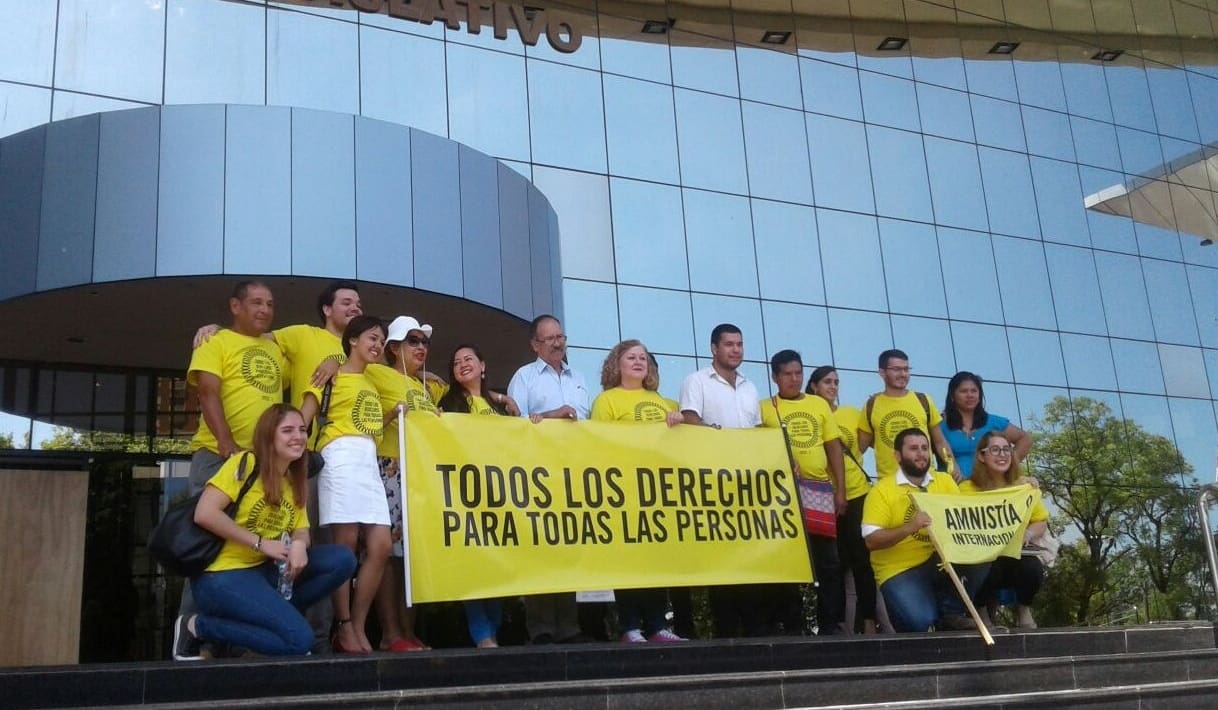Amnesty International wishes to express its grave concern about a bill approved by the Paraguayan Senate today which violates the right to freedom of association and could put the country’s civil society organizations at risk, jeopardizing their autonomy and their ability to obtain the necessary resources to carry out their human rights defense and promotion activities.
Without calling a public hearing or consultation, an extraordinary session of Paraguay’s Senate today voted in favor of a bill that “provides for oversight, transparency and accountability for non-profit organizations.” The bill will now be considered by the Chamber of Deputies. Were it to approve the bill, Paraguay’s legislative branch would be endorsing highly restrictive conditions for the country’s civil society organizations.
Ana Piquer, Amnesty International Americas director, said: “Civil society organizations are fundamental to the defense of human rights, and many people depend on their work, which means these entities must have the resources, freedom and security necessary to exist and take appropriate action. The discussion and approval of arbitrary measures that restrict the right to freedom of association cast unfounded suspicion on the actions of these organizations, making it harder to maintain an open and healthy space for the defense of human rights in Paraguay.”
Main human rights risks posed by the bill
Many aspects of the legislative proposal approved by the Senate today run contrary to the international human rights standards to which Paraguay has signed up, especially those protecting the rights to freedom of association and expression, but also the right to privacy, the right to participate in public affairs, and the right to defend human rights.
One of the main concerns about the bill passed is the lack of precision and clarity about its scope and implementation. It makes no distinction between organizations that receive public or private funds, subjecting them to the same state oversight and recording requirements. In addition, the bill does not explain the need for these new restrictions, ignoring the far-reaching existing national regulatory framework that currently enables the Paraguayan government to guarantee the transparency and accountability necessary for the operation of non-profit organizations.
The drafting of the bill is alarmingly vague and ambiguous and could leave room for a broad interpretation that would allow the authorities to incorporate organizations’ private funds in the nation’s budget. In practice, this would mean seizing assets and resources from civil society organizations, their members and their donors. It would be contrary to the Paraguayan Constitution and would represent a violation of international human rights law, which guarantees the possibility for any person, individually or collectively, to request, receive and use resources with the aim of promoting and protecting human rights.
The broad scope and imprecision of the provisions contained in the bill, including obligations to produce detailed reports on the use and purpose of the resources received, also jeopardize the independence necessary for the operation of civil society organizations and compromise the privacy and security of their members and of the people whose rights they seek to defend.
Finally, the bill introduces sanctions for non-compliance not only for legal persons, but also for the natural persons managing and running them. These sanctions include many unreasonable measures such as “permanent cessation of activities,” without specifying the circumstances in which each sanction would apply. Imposing these sanctions without the necessary clarity or due process violates the principle of legality and freedom of association, which must under no circumstances be subjected to restrictions that are disproportionate or so onerous that they put the right itself at risk.
Ana Piquer said: “This bill subjects civil society organizations to arbitrary and unreasonable oversight by the State, without giving them any possibility of defending themselves. Worse still, it jeopardizes the safety of human rights defenders and all the people who benefit from these organizations’ vital work today. We urge the Chamber of Deputies to overwhelmingly reject this proposal, and we remind the Paraguayan State that any law or public policy that affects organized civil society must be subject to a wide-ranging, inclusive consultation that involves human rights defenders and civil society organizations and is in keeping with Paraguay’s international obligations.”
Additional information
Amnesty International notes an alarming tendency in many countries in the region and worldwide to attack civic space, including through regulations that impose arbitrary and improper restrictions on civil society organizations, associations or collectives.
Contact: [email protected]

